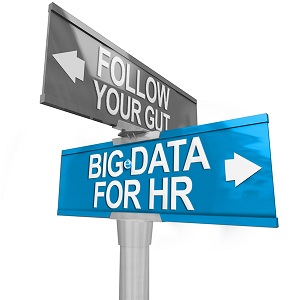 Industry insight and analysis suggests that, when it comes to Big Data, HR is at a crossroads, where leaders realize informed decision-making is critical to increasing their strategic value, but they struggle with getting started. I couldn’t agree more — and have even suggested the same in a previous post on HR organizations feeling overwhelmed by Big Data.
Industry insight and analysis suggests that, when it comes to Big Data, HR is at a crossroads, where leaders realize informed decision-making is critical to increasing their strategic value, but they struggle with getting started. I couldn’t agree more — and have even suggested the same in a previous post on HR organizations feeling overwhelmed by Big Data.
Yet, a few events and articles all converged these past few weeks that shine the light on the value of Big Data and analytics — the insights and the results that can be achieved from this work. HR needs to act swiftly to take advantage of this golden opportunity.
Let’s review what’s been happening. I’ll start with my recent webinar, titled “Big Data for HR – Using Predictive Analytics for Faster, More Accurate Talent Acquisition.” This program was developed in response to the fact that many HR professionals are hungry to learn more about Big Data. For many HR leaders, Big Data is a buzz phrase and mysterious black box. It’s impossible to derive value from a new technology if you don’t understand what it is and how it can be applied. I explained how a successful talent acquisition sourcing strategy can be predicted, planned, and executed successfully with Big Data.
By leveraging the insights of Big Data, HR organizations are equipped to make better-informed, and more strategic decisions about their recruiting marketing efforts, and therefore produce greater results for their companies.
With such insights in mind, consider how Big Data influenced the presidential election. Being the Big Data junkie that I am, I was intrigued by the Harvard Business Review blog post (“Electing a President in a Microtargeted World”) discussing how both presidential candidates leveraged vast amounts of information to better understand voters and their behaviors. The point was “to figure out which persuadable voters to spend energy — and dollars — on, in the hope of moving the dial just slightly in their favor. It’s a world where hundredths of a percentage point matter.”
How powerful: multi-million dollar campaigns using predictive analytics for better targeting and decision-making that will ultimately impact an entire nation — and world. Utilizing data and deriving insights to impact critical outcomes is certainly a lesson HR can benefit from. The power of Big Data for HR and microtargeting should not be lost on talent acquisition leaders as well.
If that weren’t enough to remind you that the Big Data for HR opportunity is real, consider what HR research analyst Josh Bersin recently said at the HR Tech Europe conference. Bersin is quoted as saying, “Data analytics has the potential to help businesses make dramatic returns by managing their workforce more effectively. This is the next big thing that is going to happen in HR.”
Bersin cited how one insurance company changed its entire hiring strategy because data analytics showed something completely different than what its HR leaders previously believed. As a result, the company significantly increased profits. Bersin advised HR departments to set up small teams to develop data analytics as a discipline within their own organizations.
This brings me back to the crossroads. I believe that most HR leaders recognize the power Big Data can bring to their organizations. However, the challenge is knowing how and where to begin. Building infrastructure, developing processes, and growing analytic competencies are not outcomes that can be achieved over night. Infrastructure and process aside, a recent survey conducted by the MIT Sloan Management Review (“Analytics – the New Path to Value“) – concluded that the biggest barriers to successful utilization of analytical data were the “lack of understanding of how to use analytics to improve the business” and the “lack of management bandwidth.”
To effectively leverage Big Data, HR organizations must seek ways to apply the insights gleaned from the analytics, recognizing that the shortage of skilled talent to perform such analysis is often the constraint.
From a talent acquisition standpoint, the value of Big Data is in the ability to make more accurate talent-oriented decisions and to take action faster. With Big Data, HR leaders now have the power to infuse critical decision-making with insights not previously attainable. Getting to desired results faster creates competitive advantage. In fact, companies that use data-directed decision-making enjoy a 5-6% boost in productivity, according to Bersin.com.
eQuest understands this imperative and is providing our customers the opportunity to experience the power of Big Data insights without having to first create a Big Data infrastructure.
If you are unsure if Big Data can make a difference, just ask Obama.
I look forward to your comments!
4 thoughts on “Big Data for HR — Can it Really Make a Big Difference?”